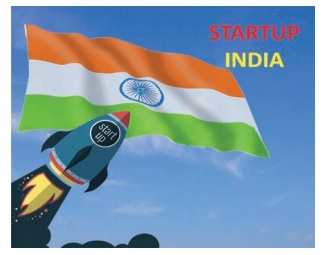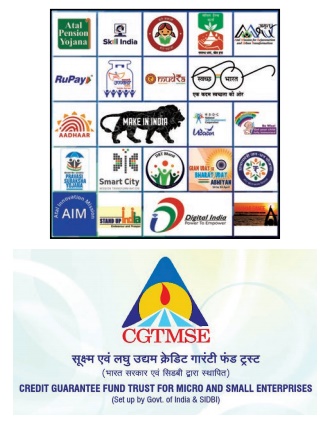Chapter: 12th Commerce : Chapter 25 : Entrepreneurship Development : Government Schemes for Entrepreneurial Development
IndiaŌĆÖs efforts at Promoting Entrepreneurship and Innovations
IndiaŌĆÖs efforts at Promoting Entrepreneurship and
Innovations
1. Startup India:
Through the Startup India initiative, Government of
India promotes entrepreneurship by mentoring, nurturing and facilitating
startups throughout their life cycle. Since its launch in January 2016, the
initiative has successfully given a head start to numerous aspiring
entrepreneurs. A ŌĆśFund of FundsŌĆÖ has been created to help startups gain access
to funding.

2. Make in India:
This scheme is designed to transform India into a
global design and manufacturing hub, the Make in India initiative was launched
in September 2014. It came as a powerful call to IndiaŌĆÖs citizens and business
leaders, and an invitation to potential partners and investors around the world
to centralize information about opportunities in IndiaŌĆÖs manufacturing sector.
This has in turn helped procure investments, foster innovation, develop skills,
protect intellectual property and build best-in-class manufacturing
infrastructure.

3. Atal Innovation Mission (AIM):
AIM is the Government of IndiaŌĆÖs endeavour to
promote a culture of innovation and entrepreneurship, and it serves as a
platform for promotion of world-class Innovation Hubs, Grand Challenges,
start-up businesses and other self-employment activities, particularly in
technology driven areas.
4. Support to Training and Employment Programme for Women
(STEP):
STEP was launched by the Government of IndiaŌĆÖs
Ministry of Women and Child Development to train women who have access to
formal skill training facilities, especially in rural India. The Ministry of
Skill Development and Entrepreneurship and NITI (National Institution for
Transforming India formally it is called as planning commission) Aayog recently
redrafted the Guidelines of the 30-year-old initiative to adapt to present-day
needs. The programme imparts skills in several sectors such as agriculture,
horticulture, food processing, handlooms, traditional crafts like embroidery,
travel and tourism, hospitality, computer and IT services.
5. Jan Dhan-Aadhaar - Mobile (JAM):
JAM, for the first time, is a technological
intervention that enables direct transfer of subsidies to intended
beneficiaries and, therefore, eliminates all intermediaries and leakages in the
system, which has a potential impact on the lives of millions of Indian
citizens.
6. Digital India:
The Digital India initiative has been launched to
modernize the Indian economy to make all government services available
electronically. The initiative aims at transforming India into a digitally-empowered
society and knowledge economy with universal access to goods and services.
7. Stand-Up India:
It was launched in 2015, Stand-Up India seeks to
leverage institutional credit for the benefit of IndiaŌĆÖs underprivileged. It
aims at enabling economic participation of, women entrepreneurs, Scheduled
Castes and Scheduled Tribes and share the benefit of Indian growth with the
above mentioned categories. Towards this end, at least one women and one
individual from the SC or ST communities is granted loans between Rs.10 lakshs
to Rs.1 crore to set up greenfield enterprises in manufacturing, services or
the trading sector.

8. Trade related Entrepreneurship Assistance and
Development (TREAD):
This schemes envisages to address the critical
issues of access to credit among IndiaŌĆÖs underprivileged women, the TREAD
programme enables credit availability to interested women through
non-governmental organizations (NGOs). As such, women can receive support of
registered NGOs in both accessing loan facilities and receiving counselling and
training opportunities to kick-start proposed enterprises, in order to provide
pathways for women to take up non-farm activities.
9. Pradhan Mantri Kaushal Vikas Yojana (PMKVY):
A flagship initiative of the Ministry of Skill
Development and Entrepreneurship (MSDE). This is a Skill Certification
initiative which aims to train youth in industry-relevant skills to enhance
employment opportunities for livelihood creation and employability.
10. National Skill Development Mission:
This scheme was unveiled in July 2015. The mission
aims at building synergies across the sectors in terms of skill training
activities. With a vision to build a ŌĆśSkilled IndiaŌĆÖ it is designed to expedite
decision-making across the sectors to provide skills at scale, without
compromising on quality or speed.
11. Science for Equity Empowerment and Development (SEED):
SEED aims to provide opportunities to motivated
scientists and field level workers to undertake action-oriented, location
specific projects for socio-economic gain, particularly in rural areas. SEED
emphasizes equity in development, so that the benefits of technology accrue to
a vast section of the population, particularly the disadvantaged.

Related Topics